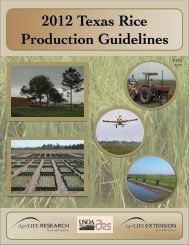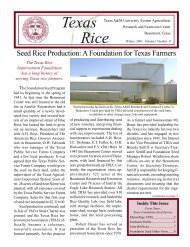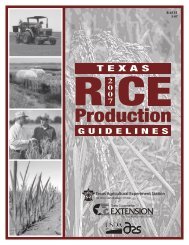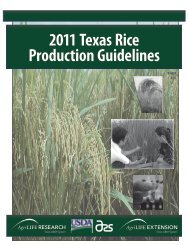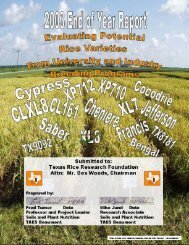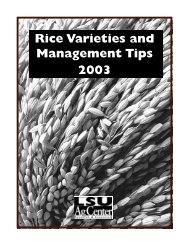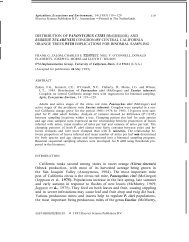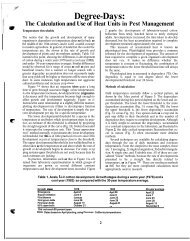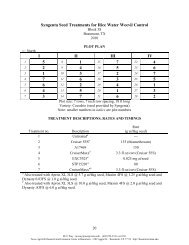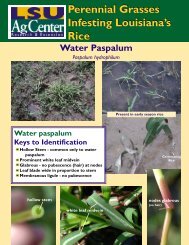Texas Rice - Texas A&M AgriLIFE Research Center at Beaumont ...
Texas Rice - Texas A&M AgriLIFE Research Center at Beaumont ...
Texas Rice - Texas A&M AgriLIFE Research Center at Beaumont ...
You also want an ePaper? Increase the reach of your titles
YUMPU automatically turns print PDFs into web optimized ePapers that Google loves.
Gasoline Additives Explained<br />
MTBE (methyl tertiary-butyl ether) has a<br />
chemical <strong>at</strong>traction to the w<strong>at</strong>er molecule and increases<br />
the solubility of other, harmful components<br />
of gasoline. Because of this, MTBE often ends up<br />
in drinking w<strong>at</strong>er, especially in cases where oil storage<br />
tanks leak near popul<strong>at</strong>ed areas, and may make<br />
contamin<strong>at</strong>ion by other compounds more likely.<br />
MTBE biodegrades very slowly, remaining in w<strong>at</strong>er<br />
for decades and has been labeled a “potential<br />
human carcinogen” by the Environmental Protection<br />
Agency.<br />
Ethyl tertiary butyl ether (ETBE) is produced<br />
by mixing ethanol and isobuylene and reacting with<br />
them with he<strong>at</strong> over a c<strong>at</strong>alyst. ETBE offers the<br />
same or even gre<strong>at</strong>er air quality benefits as ethanol,<br />
without some of the technical and logistic challenges<br />
th<strong>at</strong> face the alcohol. ETBE is approxim<strong>at</strong>ely<br />
42% ethanol.<br />
Like ethanol, ETBE reduces air pollution, increases<br />
gasoline octane and can help reduce the import<strong>at</strong>ion<br />
of crude oil into the U.S. One of the<br />
logistic challenges th<strong>at</strong> has hampered ethanol historically<br />
is its inability to be shipped in the U.S.<br />
pipeline system. Because ethanol is likely to pickup<br />
any w<strong>at</strong>er or other contaminants left in the line,<br />
it has been confined to transport<strong>at</strong>ion by truck, barge<br />
or rail. This is not the case with ETBE. ETBE can<br />
be blended into the final gasoline right in the refinery<br />
and then shipped to its point of sale through the<br />
traditional transport<strong>at</strong>ion pipeline.<br />
Another plus for ETBE is its lower vapor pressure<br />
- or evapor<strong>at</strong>ive properties. When ethanol is<br />
blended with gasoline, it makes the fuel evapor<strong>at</strong>e<br />
more quickly, which is a concern when air quality<br />
is considered. By converting the ethanol into ETBE,<br />
this issue is elimin<strong>at</strong>ed. In fact, ETBE can actually<br />
cause a slight reduction in the overall vol<strong>at</strong>ility of<br />
gasoline.<br />
There are two basic types of facilities th<strong>at</strong> can<br />
produce ETBE; a small plant based in a refinery<br />
th<strong>at</strong> produces ETBE only for the gasoline it produces,<br />
or larger “merchant” plants th<strong>at</strong> produce<br />
ETBE for resale. Currently there is no real ETBE<br />
production in the U.S., but virtually all of the existing<br />
MTBE plants have the ability to switch to<br />
ETBE production. ETBE is used much more in<br />
Europe. *<br />
10<br />
County Judge Proactive Over<br />
Ethanol Funding<br />
Jefferson County Judge Carl Griffith organized a<br />
meeting with area farmers to discuss a str<strong>at</strong>egy for<br />
securing funding in the Energy Bill th<strong>at</strong> will bring ethanol<br />
production to Southeast <strong>Texas</strong>. The following is<br />
taken from a policy paper released by his office in early<br />
June.<br />
GOAL: To bring ethanol production to Southeast<br />
<strong>Texas</strong> using crops grown in the region as a feedstock,<br />
for manufacture of ETBE as a replacement for MTBE.<br />
This effort will reinvigor<strong>at</strong>e agriculture production in<br />
Southeast <strong>Texas</strong>, while also providing a conversion<br />
option for MTBE producers in the region.<br />
WHAT IS NEEDED: Assistance from Sen<strong>at</strong>ors<br />
Cornyn and Hutchison to offer an amendment to the<br />
pending Energy bill to fund a feasibility/demonstr<strong>at</strong>ion/pilot<br />
ethanol production project using rice,<br />
sugarcane, sorghum or other crops as a feedstock. Note<br />
th<strong>at</strong> Sec. 207 of the pending bill is specific to sugarcane.<br />
While it lists <strong>Texas</strong> among the eligible st<strong>at</strong>es, its<br />
limit<strong>at</strong>ion to sugarcane restricts the ability to use rice,<br />
sorghum and other crops. We support the efforts of<br />
the sugarcane producers and would not want to see<br />
Sec. 207 changed in such a way as to diminish their<br />
efforts. Ideally, we would explore the feasibility of<br />
a single facility utilizing all of these feedstocks. Perhaps<br />
Sec. 209 could be amended <strong>at</strong> Sec. (c)(1) to include<br />
rice and other grains th<strong>at</strong> have not been studied<br />
as an ethanol feedstock, as well as cellulosic m<strong>at</strong>erial,<br />
and provide th<strong>at</strong> one of the projects be done in Jefferson<br />
or Chambers County.<br />
IMPACT: The Reformul<strong>at</strong>ed Gasoline (RFG) and<br />
Oxygen<strong>at</strong>ed Fuels programs of the Clean Air Act require<br />
the addition of oxygen<strong>at</strong>es to fuels. The two<br />
most common oxygen<strong>at</strong>es are ethanol and methyl tertiary<br />
butyl ether (MTBE). Ethanol produced in Southeast<br />
<strong>Texas</strong> could be used in the region’s refineries to<br />
produce ETBE. The facilities are currently refining<br />
MTBE. As momentum builds for the phase-out of<br />
MTBE as an additive, these facilities and their<br />
workforces are thre<strong>at</strong>ened. With liability protections<br />
and conversion incentives, they have expressed interest<br />
in conversion to ETBE. This approach would reinvigor<strong>at</strong>e<br />
agriculture in Southeast <strong>Texas</strong> and<br />
elsewhere, while also addressing the MTBE issue.*



